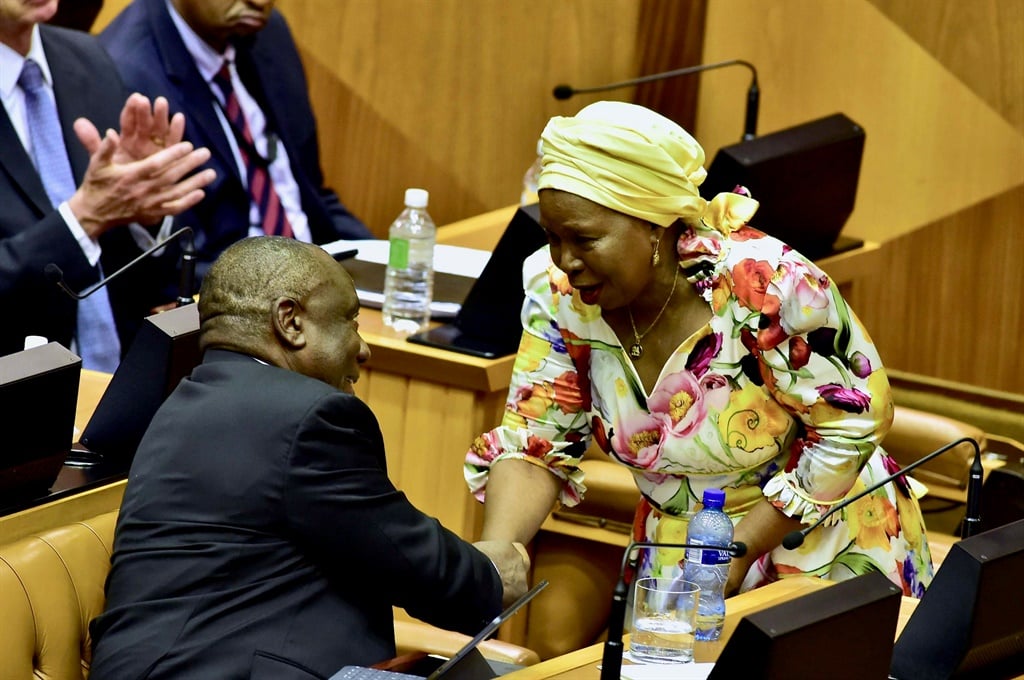


Cooperative Governance and Traditional Affairs Minister Nkosazana Dlamini-Zuma with President Cyril Ramaphosa.
- Minister Nkosazana Dlamini-Zuma has said government does not have any desire to extend the alcohol ban longer than necessary.
- She has provided reasons to the court as to why government decided to reimpose the alcohol ban during the lockdown to curb the spread of Covid-19.
- Wine farmers have taken government to court challenging the decision and citing the profound economic impact of the ban on the local wine industry.
Cooperative Governance and Traditional Affairs Minister Nkosazana Dlamini-Zuma has said government will re-evaluate the alcohol ban regularly as it wants to limit the hardships facing the economy and livelihoods during the Covid-19 lockdown.
Dlamini-Zuma filed the reasons why government reimposed the alcohol ban as wine farmers took it to court to challenge government’s decision.
On 12 July, President Cyril Ramaphosa announced the reimposition of the alcohol ban with immediate effect after alcohol sales were allowed under Level 3 of the nationwide lockdown to curb the spread of Covid-19.
In her papers filed to the court, Dlamini-Zuma has said government has no desire to leave the alcohol ban in place longer than necessary.
“It is contemplated that the suspension of the sale of liquor will be re-evaluated with regularity as government aims to also limit hardships facing the economy and individual livelihoods during this period. There is no desire on the part of government to leave this prohibition in place for longer that it is regarded necessary,” she told the court.
OPINION | Does the data support the alcohol ban?
The Southern African Agri Initiative (SAAI), which represents 120 wine farmers, approached the High Court, calling the alcohol ban “irrational, arbitrary and unreasonable”.
Dlamini-Zuma gave a detailed account of how the decision to reimpose the ban was arrived at, including listing several advisories received by the Ministerial Advisory Committee advising government.
“I considered a wide array of empirical evidence as to whether a temporary prohibition on liquor was an appropriate tool to alleviate the burden caused by the rapidly increasing rate of transmission of Covid-19 and overcrowded hospitals, and whether less stringent methods might yield the same results”.
Dlamini-Zuma insisted that it was simply a short-term measure amid the pandemic.
“The prohibition on the sale of liquor was taken as a temporary measures until the rate of infection slows down or drops. It is one of a number of measures imposed to slow down or drop the rate of infection, together with other measures imposed, such as the curfew and social distancing in public places.”
READ | Cogta’s adjustment budget to fight Covid-19 tops R107bn
The wine industry argued that the commercial impact of Covid-19 was devastating for the local industry.
“The commercial impact of Covid-19 is far less on the liquor industry than on local wine, of which the financial [success] depends on South Africa sales. The wine farm industry cannot survive the devastating impact of a total ban on local wine sales for four to six months,” they told the court.
No exemptions
Dlamini-Zuma said government could not exempt the sale of wines or any specific types of liquor from the ban as it would not provide the effective relief on the healthcare system that is required at a time of a huge surge in Covid-19 cases.
South Africa has more than 460 000 confirmed cases of Covid-19.
“There was also no empirical evidence before that wines and other types of liquor do not contribute to alcohol related trauma cases or that they do so in a significantly negligible manner,” she said.
OPINION | Maybe Dlamini-Zuma’s a genius; a villain we all need
Dlamini-Zuma also dismissed the argument that the healthcare system was not constrained in affluent areas and as a result alcohol should be allowed to be sold there.
“Furthermore the burden on the healthcare system caused by the pandemic applies across all areas, including affluent areas. When hospitals are full in less affluent areas, which are served mainly by public hospitals, patients are transferred to hospitals in affluent areas including private hospitals by specific agreement in each province.”
READ HERE | Dlamini-Zuma gets flak for focusing on ‘zol and alcohol’ while municipalities are looted
While Dlamini-Zuma appeared empathetic to the concerns of the wine industry, she said government was compelled to make hard choices for purposes of ensuring that emergency centres and health facilities remain operational and available and that healthcare personnel are not unduly burdened.
“This is a delicate balance which must be carefully drawn based on the facts at any given period of time.”

